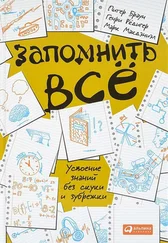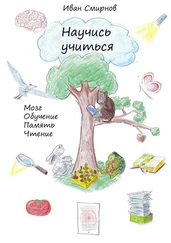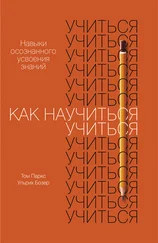Wiggins, Grant, Jan McTighe, and Jay McTighe. Understanding by Design . Alexandria, VA: Association for Supervision & Curriculum Development, 1998.
Willingham, Daniel T. Cognition: The Thinking Animal . 3rd ed. Upper Saddle River, NJ: Pearson, 2006.
—. Why Don't Students Like School? A Cognitive Scientist Answers Questions about How the Mind Works and What It Means for the Classroom . San Francisco: Jossey-Bass, 2010.
В следующих примечаниях я привожу источники взятого мной материала с необходимыми пояснениями. Если я брал у кого-то интервью, то сообщал об этом в тексте, и тогда дополнительный источник не был указан. Если я цитирую что-то из внешних источников, это отражено в данных примечаниях.
1. Barry J. Zimmerman and Anastasia Kitsantas, «Developmental Phases in Self-Regulation: Shifting from Process Goals to Outcome Goals», Journal of Educational Psychology 89, no. 1 (1997): 29.
2. Hester de Boer et al., Effective Strategies for Self-Regulated Learning: A Meta-Analysis (Gronigen: GION/RUG, 2013). Также см. Kiruthiga Nandagopal and K. Anders Ericsson, «An Expert Performance Approach to the Study of Individual Differences in Self-Regulated Learning Activities in Upper-Level College Students», Learning and Individual Differences 22, no. 5 (2012): 597–609.
3. Anastasia Kitsantas and Barry J. Zimmerman, «Comparing Self-Regulatory Processes Among Novice, Non-Expert, and Expert Volleyball Players: A Micro Analytic Study», Journal of Applied Sport Psychology 14, no. 2 (2002): 91–105; Barry J. Zimmerman and Anastasia Kitsantas, «Acquiring Writing Revision Skill: Shifting from Process to Outcome Self-Regulatory Goals», Journal of Educational Psychology 91, no. 2 (1999): 241. Также см.: Mark C. Fox and Neil Charness, «How to Gain Eleven IQ Points in Ten Minutes: Thinking Aloud Improves Raven's Matrices Performance in Older Adults», Aging, Neuropsychology, and Cognition 17, no. 2 (2010): 191–204.
4. Ulrich Boser, «Does the Public Know What Great Teaching and Learning Look Like?» Center for American Progress, в печати. Обратите внимание, что в исследовании взята удобная выборка, которая, по нашему мнению, может экстраполироваться на всю страну. Документ будет доступен на моем сайте и сайте центра.
5. Louis Alfieri et al., «Does Discovery-Based Instruction Enhance Learning?» Journal of Educational Psychology 103, no. 1 (2011): 1–18. Также Richard E. Mayer, «Should There Be a Three-Strikes Rule Against Pure Discovery Learning?» American Psychologist 59, no. 1 (2004): 14–19.
6. Harold Pashler et al., «Psychological Science in the Public Interest», Learning Styles: Concepts and Evidence 9, no. 3 (2008): 105–119. Также см.: Thomas K. Fagan and Daniel T. Willingham, «Do Visual, Auditory, and Kinesthetic Learners Need Visual, Auditory, and Kinesthetic Instruction?» American Educator (Summer 2005): 31–35.
7. Katherine Hobson, «Google on the Brain: How the Internet Has Changed What We Remember», Wall Street Journal , July 15, 2011. Полное исследование: Betsy Sparrow, Jenny Lui, and Daniel M. Wegner, «Google Effects on Memory: Cognitive Consequences of Having Information at Our Fingertips», Science 333, no. 6043 (2011): 776–778.
8. Linda A. Henkel, «Point and Shoot Memories: The Influence of Taking Photos on Memory for a Museum Tour», Psychological Science 25, no. 2 (2014): 396–402. Цитата о мозге дана по: James Gleick, «Auto Correct This!» New York Times, August 4, 2012. http://www.nytimes.com/2012/08/05/opinion/sunday/auto-correct-this.html.
9. Brenda Fowler, Iceman: Uncovering the Life and Times of a Prehistoric Man Found in an Alpine Glacier, 1st ed. (New York: Random House, 2000). Также я почерпнул информацию из: Bob Cullen, «Testimony from the Iceman», Smithsonian, http://www.smithsonianmag.com/science-nature/testimony-from-the-iceman-75198998/(дата обращения: 13.09.2016) и с сайта Южно-Тирольского музея археологии: http://iceman.it/en/(дата обращения: 20.09.2016).
10. Richard Paul and Linda Elder's The Thinker's Guide for Students on How to Study and Learn a Discipline: Using Critical Thinking Concepts & Tools, Foundation for Critical Thinking (2003). Также полезная информация содержится в: Lindsey Engle Richland and Nina Simms, «Analogy, Higher Order Thinking, and Education», Wiley Interdisciplinary Reviews: Cognitive Science 6, no. 2 (March 2015): 177–192.
11. Frank Levy and Richard J. Murnane, The New Division of Labor: How Computers Are Changing the Way We Work (Princeton, NJ: Princeton University Press, 2004). О предсказании Леви и Мернейна об автомобилях с автопилотом первым рассказал мне Тед Динтерсмит. Более современный взгляд на проблему см.: Derek Thompson, «What Jobs Will the Robots Take?» The Atlantic, January 23, 2014. http://www.theatlantic.com/business/archive/2014/01/what-jobs-will-the-robots-take/283239/.
12. Ulrich Boser, «Return on Educational Investment: A District-by-District Evaluation of US Educational Productivity», Center for American Progress, January 2011. Показатель 50 % взят из: Scott Freeman, Sarah L. Eddy, Miles McDonough, Michelle K. Smith, Nnadozie Okoroafor, Hannah Jordt, and Mary Pat Wenderoth, «Active Learning Increases Student Performance in Science, Engineering, and Mathematics», Proceedings of the National Academy of Sciences 111, no. 23 (2014): 8410–8415; doi:10.1073/pnas.1319030111. Обратите внимание, что Фриман анализировал только результаты по курсам точных наук.
13. J. D. Karpicke and J. R. Blunt, «Retrieval Practice Produces More Learning than Elaborative Studying with Concept Mapping», Science 331, no. 6018 (2011).
14. Я обязан автору Брюсу Шнейеру, который приводит сходный аргумент в отношении безопасности. Конкретные описанные мной этапы были сформулированы на основании работ многих авторов, посвященных различным стадиям обучения, в том числе Барри Циммермана, Рут Кларк, Джона Флавелла и Кеннета Кьевры. Цитата об обучении как инструменте выживания взята из: Robert A. Bjork, John Dunlosky, and Nate Kornell, «Self-Regulated Learning: Beliefs, Techniques, and Illusions», Annual Review of Psychology 64, no. 1 (January 3, 2013): 417–444, doi:10.1146/annurev-psych-113011-143823.
Также использовано
Dunlosky, John, et al. «Improving Students' Learning with Effective Learning Techniques: Promising Directions from Cognitive and Educational Psychology.» Psychological Science in the Public Interest 14, no. 1 (2013): 4–58.
Читать дальше
Конец ознакомительного отрывка
Купить книгу
![Ульрих Бозер Как научиться учиться [Навыки осознанного усвоения знаний] обложка книги](/books/394994/ulrih-bozer-kak-nauchitsya-uchitsya-navyki-osoznan-cover.webp)











